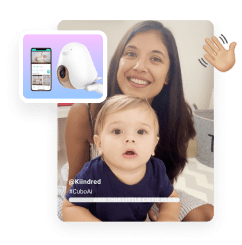Your child’s first words: A complete guide to teaching toddlers to talk
When my toddler started talking, I joked with my husband that I now had my own Man Friday, you know Robinson Crusoe’s best friend on the island. Except I spent most of my days with him glued to my hip.
We communicated in two-word sentences:
“Bird, go.”
“Me cookie.”
And we’re just one word away from Cookie Monster’s “Me want cookie.”
It was cute. And I loved it every time he called a “Butterfly” a “Flutterfly” or said “pwetty” instead of pretty. I didn’t want to correct him, and as a parent who had done extensive research on language development in children, I knew I had to encourage the baby talk.
Here’s why:
Talking clearly and slowly to a child is important because their brain is processing all the sounds and information. Children listen to their parents communicate and according to language researchers, this is one of the most important ways a child learns to speak and add words to their vocabulary.
Here’s a complete guide to teaching your toddler to talk:
When should a toddler start talking?
Babies are smart, and they know communication is vital to survival. So, they cry or wail to let you know if they are hungry and irritated.
A child’s brain starts to recognise the speech sounds of the language they hear. After spending 6 months listening to their caretakers, they begin to understand the basic sounds and voices and may even turn their heads when you call their name.
Around this time, they also start to babble: “mamamma” or “dadadada”
It is around the 7-month mark that some babies say their first word. For others, it may be 9 months or even 11 months. And that is fine.
Just a heads up, the word “no” is one of the most common first words. So unless you want your child’s first word to be “no” make sure you avoid saying it around them. Here’s how you can say no without saying no.
By the time these little ones become toddlers, they are well on their way to being able to communicate using simple words.
A toddler should be able to link words together to make small sentences and use pronouns like “I’ and ‘you.’ In addition, they should be able to identify everyday objects like cars and trees.
Get tailored content based on your week of pregnancy
By signing up, you agree to receiving our Newsletters. Cancel anytime.



What is considered late talking in toddlers?
If a child is unable to meet any milestones for speech or development and is showing signs of delay, a paediatrician should be consulted. “Late talker” is a term used for kids who have a vocabulary of fewer than 10 words by the age of 18 months.
If by the 16th month, the child still hasn’t said his first word, it may be time to consult a doctor. Sometimes a delay may be caused by hearing loss, while other times it may be due to a speech or language disorder.
But the good news is, early intervention and speech therapy can help you and your child overcome this obstacle.
Should a 2-year-old be fully talking?
While it may be tempting to constantly compare our child’s performance to other kids, it is important to remember that every child learns at their own pace.
Multiple factors come into play. Research also found that girls start speaking earlier than boys and also use more complex language than boys.
However, some milestones can help a parent understand their child’s development. The NIH shares a detailed hearing and communicative development checklist based on the child’s age.
According to this, by the time your little one is two, they should be able to understand and follow basic everyday requests like “Let’s play” or “Do you want a banana?”
They should also be able to understand questions like “Where’s the dog?” or point to objects in pictures or their surroundings. It is also a great time to learn and enjoy simple songs, rhymes, and stories.
While your 2-year-old will not be fully talking, they will be able to get their point across by joining two or more together, like “baby cry” or “go park”.
A 2-year-old vocabulary includes around 50-100+ words which include words like go, eat, cup, dog, etc.
Although, I do feel I should warn you: it is cute when they say “mum” for the first time. But when a toddler says “mummy” for the 40th time during a five-minute work call, it can be quite a test of patience.
Because a 2-year-old comes with a fierce determination to communicate and will continuously repeat words until they get their point across or get what they want.
I remember once when my 2-year-old kept on saying “bato bato” while I cooked dinner. After 15 minutes of pointing at different objects and ravaging the pantry, it turned out all he needed was a “tomato” because he’d seen me chop one and put it in the pot.
Dinner was burnt that night.
As they near the 3-year mark, toddlers start to speak in complete sentences and speak more fluently. They will be able to communicate their feelings and describe things they did in the past and use more complex sentences.
The developmental milestones checklist is a good guideline to help parents evaluate their child’s progress and if needed, get professional help.
Teach your toddler to talk
Teach your toddler to talk, they said. It’ll be fun, they said.
What they didn’t tell you is that you have to be prepared for what comes next. The “no’s,” and the “whys?”
Because answering deep philosophical questions like, “Why can’t I pee in the cat litter” is what makes this parenting journey so special, right? Right.
Here’s how you can get your toddler to talk and also spill the beans on who broke Mama’s favourite coffee mug. (He insists it was the cat, but I’m sure it was my husband.)
1. Do the baby talk:
Kids just need a little nudge in the right direction. One way to encourage your toddler to talk is to communicate at home. Not only is it a great way to help your toddler learn, but it is also a great way to bond with your toddler.
2. Read, sing and play with them
Sing songs that they like and encourage toddlers to talk by asking them to join in, narrate the world around them, such as by counting or describing the colours of objects.
Going to the park or just stepping out for a grocery run?
Take this as an opportunity to describe and talk about the things you see.
3. Have patience
It is important to listen to your child. Don’t try to complete their sentences or correct their pronunciation.
And when they ask why they can’t eat food from the bowl like the cat, get ready to have an interesting conversation.
Related Articles
How to talk to your child without yelling
Is your child’s speech delayed? 4 ways music can help
How to respond when your kid talks back
Related Articles

Zofishan Umair Follow +
Zofishan is a journalist, humour columnist, and a mum who has survived nappy explosions mid-air. She has over a decade of experience writing for print and online publications and is currently working on her first book.




